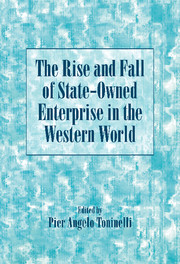Book contents
- Frontmatter
- Contents
- Preface
- Contributors
- PART I SETTING THE STAGE
- 1 The Rise and Fall of Public Enterprise: The Framework
- 2 The Decline of State-Owned Enterprise and the New Foundations of the State-Industry Relationship
- 3 The Performance of State-Owned Enterprises
- 4 The Role of the State in Economic Growth
- PART II NATIONAL CASES
- Index
1 - The Rise and Fall of Public Enterprise: The Framework
Published online by Cambridge University Press: 05 December 2011
- Frontmatter
- Contents
- Preface
- Contributors
- PART I SETTING THE STAGE
- 1 The Rise and Fall of Public Enterprise: The Framework
- 2 The Decline of State-Owned Enterprise and the New Foundations of the State-Industry Relationship
- 3 The Performance of State-Owned Enterprises
- 4 The Role of the State in Economic Growth
- PART II NATIONAL CASES
- Index
Summary
In recent times, the role and even the existence of public enterprise have been subjected to strong, often devastating criticism, both in economic-political literature and in sociopolitical debate. At the same time, the term and the concept of “nationalization,” the main process by which state-owned enterprises (SOEs) are created, has been assuming a negative value. It is increasingly used in close connection with its opposite term, “privatization”: this emphasizes the dramatic change that has taken place in the economic policies of most Western economies.
The declining fortune of public enterprise has to be explained primarily by its increasing economic, financial, and managerial difficulties, as the essays in this volume show. These difficulties derive from the public and political nature of SOE activities. A comprehensive survey of SOE history has to take into consideration changes in the social, economic, and political environments that have profoundly influenced the course of the twentieth century. The move to autarkic and state-controlled policies in many Southern and Central European countries, the diffusion of collectivism and socialism in Eastern European countries, and the progressive growth of mixed economies in Western European countries all should be considered reactions – albeit profoundly different ones – to the same issue: the deep crisis that struck liberal capitalism in the period between the two world wars. Different though they were, these reactions shared at least two common features. First, there was a more or less explicit recognition that the free market economy had grown progressively weaker. Its very nature and viability were menaced by increasing failures and by the belief that the state could and should play a greater (or, for some, a total) role in overcoming these failures.
- Type
- Chapter
- Information
- Publisher: Cambridge University PressPrint publication year: 2000
- 21
- Cited by

